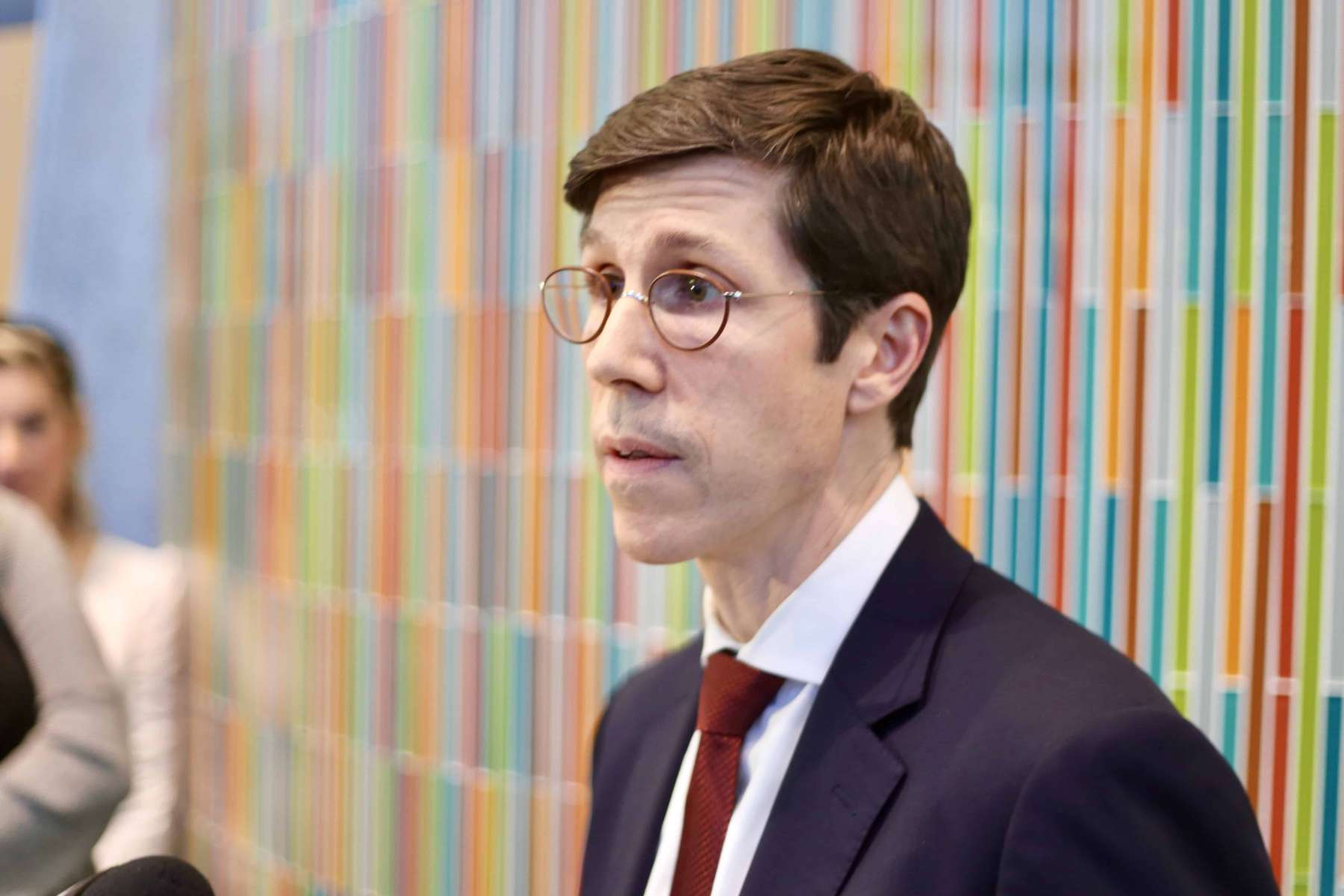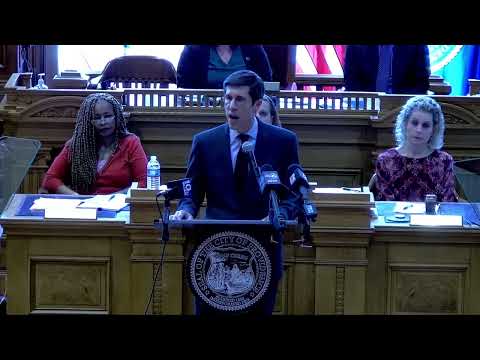Controversial Tax Shift: Mayor Smiley’s Budget Address Sparks Debate in Providence
Mayor Brett Smiley’s proposed budget has created waves, calling for a commercial property tax cut and a residential tax increase. The controversial move aims to provide relief to renters, but critics argue it may not be the solution Providence needs.
April 26, 2023, 11:21 am
By Steve Ahlquist
Providence Mayor Brett Smiley‘s 2023 Budget Address before the City Council lasted less than 20 minutes Tuesday night, but in that short time he stirred controversy with the announcement of a commercial property tax cut and a residential tax increase. You can read the proposed budget here and watch the Mayor’s address here:
Mayor Smiley’s proposed budget would decrease commercial rates by about $1900 a year in “an effort to provide rent relief to the many families that reside in commercially taxed buildings” while residential tax rates will see an increase, on average, of about $400 a year.
“I took a serious look at every facet of the City’s spending and what I found was clear: our current system was not sustainable,” said Mayor Smiley. “The proposed changes would rebalance the City’s tax rates, refocus the use of federal dollars and prepare us for a possible recession.”
The tax cuts on commercial properties, the Mayor said, might be passed on to renters, but as the Providence Journal’s Amy Russo put it to the Mayor, “Landlords being landlords, are they really going to lower their rents?”
“This is one way, one tangible way, the city can release some of the pressure on…rental increases,” responded Mayor Smiley. “It is my hope that this will be either passed onto the renters or slow or pause the rental increases which are killing our residents.”
The idea that landlords would pass tax savings onto renters, “has not been my experience in my neighborhood of Federal Hill and Ward 13,” said Council President Rachel Miller. “I think a conversation about rent stabilization is still urgently needed.” Mayor Smiley said that he doesn’t believe rent stabilization is the right policy solution.
“The best policy solution is the rapid expansion of additional housing in Providence,” said the Mayor. “We have a supply problem – not enough apartments to rent, which is why under my administration will aggressively build new affordable, low-income and market rate housing which will provide the relief that our renters deserve.”
As for a residential tax increase, Council President Miller held back from offering an opinion, saying that it’s hard to judge the idea without seeing what the actual impact of the increase will be, but she expressed enthusiasm about the City’s Council vetting process, which will have multiple opportunities for public input.
City Councilmember Pedro Espinal (Ward 10) was more direct. “Last year, through the reevaluation, taxes went up in my community … so our people are paying more today in taxes.” Even a slight increase is cause for worry, noted Councilmember Espinal.
Asked what a “modest increase” in residential taxes might mean to people just getting by, Mayor Smiley responded that, “We have to ask ourselves what the alternative is… The only other way to balance this budget is to cut services. That means fewer resources for our neighborhoods.”
The Mayor’s proposed tax policy spurred Providence City Councilmember Miguel Sanchez (Ward 6) to tweet:
Mayor Smiley also proposed the new position of “Housing Support Coordinator” who will work with community partners to provide the appropriate level of response to people who may not have a home – many of whom live with mental health challenges or substance use disorders.
“There are a lot of community partners working in Providence and a lot of government agencies working in Providence and there is not a lot of coordination between what [for example] Amos House is doing and what Crossroads is doing, what Open Doors is doing, what the State is doing,” said Mayor Smiley. “There was no single point of contact in City government whose responsibility it was to make sure we knew who was doing what to provide for those folks in our community who are struggling and are unhoused.”
The new position will be housed in the City’s Department of Healthy Communities and “will help coordinate those responses” with an eye towards efficiency in delivering services and making sure nobody falls through the cracks.
During his address on to the City Council, Mayor Smiley introduced Eileen Hayes of Amos House, to a round of applause. The budget contains a 25 percent increase to the City’s funding of Amos House’s “A Hand Up” program that provides workforce opportunities to individuals experiencing homelessness.
“While we work to improve services, we will also commit to tackling some of the biggest challenges our city faces – like ensuring that all people who want to live in Providence can find a home here,” said Mayor Brett Smiley. “We are incredibly grateful for the work Eileen Hayes and her team at Amos House continue to do as we work to improve access to affordable housing and supporting individuals in breaking cycles of homelessness.”
Other budget details Mayor Smiley emphasized in his speech include renegotiating the City’s payment in lieu of taxes (PILOT) agreements with the various non-profits in the City. While continuing negotiations, the Administration is pursuing two pieces of legislation – a commercial property tax and a payroll tax – to sustainably expand its tax base. The commercial property tax seeks to compensate the City for instances where these large institutions buy buildings and lease them to for-profit entities while being granted tax exemptions. The payroll tax seeks to provide Providence directly with a portion of new payroll taxes whenever these institutions grow.
“The City needs these funds, in order to keep paying our bills on time and to provide the high-quality services we all deserve,” said Mayor Brett Smiley. “But equally, the meds & eds also need Providence to be a city where students, doctors, researchers and their employees want to be. We will continue negotiating in the months ahead and I look forward to reaching a new agreement that meets both of our needs.”
Additionally, funding is proposed to improve litter removal ($300,000), graffiti removal ($222,000), sidewalk improvements ($193,000) and an increase in Downtown and park space ($25,000), so that the city is clean and welcoming for all residents, students, businesses and visitors. It also includes a $100,000 investment for a new, modern 3-1-1 system to better track, report and resolve constituent requests. These are key investments in making Providence the best-run city in America.
There is also money allocated for the training and hiring of more police officers, as well as a commitment to aggressively enforce noise ordinances and ordinances against ATV riders. The budget includes investments for two training academies that will bring up to 80 new officers to the Department over the next year. Additionally, the proposed budget includes $3.1 million in new investments for two fire academies, so the Providence Fire Department has adequate staffing levels.
The Mayor also prioritized being prepared take back control of the City’s schools, which former Mayor Jorge Elorza allowed to be taken over by the State, possibly as a move towards breaking the teacher’s union and privatizing the public school system. With the direction of the schools, for now, in the hands of the State, Mayor Smiley’s spoke about enhancing out-of-school learning time. The proposed budget increases investment in the Providence After School Alliance by 10 percent ($385,000 total); increases its investment in the Recreation Department by 5 percent ($150,000) to focus on community engagement and infrastructure repair; and supports summer learning ($580,000) and EAT, PLAY, LEARN PVD that offers hundreds of youth employment and low-cost summer recreation opportunities.
The City Council now begins the process of vetting the Mayor’s proposed budget, which will include, for the first time, a second opportunity for public comment after the Council issues revisions.
In the past, after the public comment period that occurs during the Finance Committee meetings, changes were made by the council, and then voted on. That process will be different this year, indicated Council President Miller.
“We are escalating public input in a way that hasn’t happened in years past,” said Council President Miller. “Finance committee meetings are always open to the public, but we’ve never had the chance to vet the second proposed budget. Even as a councilmember, that has been a little bit opaque to me.”
In the past this “second proposed budget” contained changes that the City Council and the public never had a chance to engage with and discuss.
“That is the big change. We will have a second public hearing after we have made new, proposed changes to this budget,” said the Council President, “And actually have a chance for public feedback, and process it, before we vote as 15 council people.”
Black Lives Matter RI PAC had the following reaction:
A budget is more than just a series of numbers on a page, it is an embodiment of values and principles. If that is true, then Mayor Smiley’s budget does a grave disservice to Black & Brown communities in Providence.
We urge the Mayor and City Council of Providence to reject the current budget proposal. It fails to prioritize the needs and values of the city’s residents. LaJuan Allen, board member, said “the proposed allocation of millions of dollars towards policing and harmful strategies demonstrates a lack of concern for police reform and the increasing police violence in marginalized communities.”
Furthermore, the proposed hike in residential taxes disproportionately burdens homeowners and worsens the affordable housing crisis. We call on the City Council to work with the Mayor to craft a more equitable budget that addresses the community’s needs.
A preliminary review of the budget raises the following concerns:
- Despite a historic low in violent crime in Providence, the decision to invest an additional $8 million in the Providence Police Department (PPD) while level-funding Providence Public Schools (PPSD).
- Ignoring the recommendations of the Providence Municipal Reparations Commission, which sought to support the city in repairing the harms that Black and Brown families have endured by the city and other private institutions.
- Stalling the implementation and dissemination of APRA funds for community programs & organizations that sought to mitigate the impact of the pandemic in Black and Brown communities.
- The promotion of the newly announced ATV enforcement program, which includes invasive surveillance techniques and may lead to unnecessary criminalization.
- Increasing residential tax rate while decreasing the commercial tax rate (which will have a disproportionate impact on Black & Brown homeowners).







